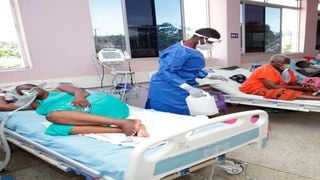
A nurse attends to Covid-19 patient recuperating at Jaramogi Oginga Odinga Teaching and Referral Hospital in Kisumu County on June 10, 2021.
| Tonny Omondi | Nation Media GroupNews
Premium
Private firms pay Sh1.2bn for Covid patients as NHIF dithers
Kenyan insurers have spent Sh1.2 billion on settling Covid-19 medical bills, which amounts to 75 percent of the total claimed amount, as the state insurer turns down patients, forcing them to pay cash.
According to documents seen by the Nation, by June 30, 2021, the total amount claimed stood at Sh1.6 billion, up from Sh1.1 billion on March 31, 2021, an increase of 44 per cent in Covid-19 claims.
Of these, Sh1.5 billion were inpatient claims representing 88 per cent and Sh197 million, from outpatient claims representing 12 per cent of all the claims. Rejected Claims stood at Sh397 million, while the outstanding claims are Sh37 million.
From the total claims, five companies had a total claimed amount of more than Sh100 million, 10 others claimed between Sh10 and Sh100 million while four claimed less than Sh10 million.
From the data submitted from 19 medical underwriters, the industry received 15,522 claims, out of these, 3,924 were inpatient claims representing 25 per cent of all the claims and 11,588 outpatient claims representing 75 per cent.
Out of the 19 companies, the one with the highest claims had 3,670 for the same period, with the lowest paying only for four claims.
The insurers only cover expenses incurred in public hospitals where bills for treatment of the infectious virus are estimated at Sh135,000, and at selected private ones where a patient has to be admitted to.
Most of the insurance companies are now paying for the testing of Covid-19 in all centres.
Private hospitals
“The facilities that we settle the bill include the ones run by the central government and county governments. Persons treated in private hospitals will be requested to make their arrangements,” Mr Godfrey Kiptum, the IRA chief executive said in an earlier interview.
Earlier, the insurers were turning away patients in droves despite having hundreds of thousands of shillings still unspent on their medical covers, on grounds that the classification of Covid-19 as a pandemic meant that patients have to pay the bills.
However, this has since changed and only the National Health Insurance Fund (NHIF), which pools money from Kenyans, turns away patients on the basis that it only covers civil servants and police officers.
This is even as the fund has come up with amendments that will make each household in Kenya pay a Sh500 compulsory monthly contribution as the state lines up a health cover for all Kenyans.
The state-backed NHIF is the biggest health insurer in the country, with a coverage of 15.8 percent.
So far, the fund has paid Sh409 million for Covid-19 treatment for the two groups it covers. It has reimbursed Sh259 million for the National Police Service Commission and Sh150 million for Civil Servants.
The NHIF chief executive Peter Kamunyo said the fund cannot undertake the costs related to Covid-19 management for the current national or enhanced medical scheme members.
“Due to the enormous financial outlay that would be required to cover members for the pandemic, coupled by the fact that the risk exposure of Covid-19 cannot be accurately determined, NHIF has not been able to undertake the costs related to Covid-19 management for the rest of the members,” he said.
He, however, said that following President Uhuru Kenyatta’s directive, frontline workers under the National Police Service, Kenya Prisons Service, civil servants and employees of National Youth Service are covered for among other benefits, critical illnesses, including Covid-19 treatment.
Huge treatment costs
According to the fund, with Covid-19 being a pandemic with huge treatment costs, it is not possible for it to continue paying the treatment costs.
Covid-19 treatment costs vary widely, depending on the severity of the disease and the hospital.
According to a model by the Kenya Medical Research Institute (Kemri), Covid-19 case management daily costs per patient in hospitals range from Sh21,000 for asymptomatic patients and those with mild symptoms, Sh24,705 for patients with severe disease and Sh51,684 for critical patients in intensive care units.
Going by Kemri’s estimates, a patient with severe symptoms put in isolation for a week would be required to pay more than Sh350,000 in hospital bills, or Sh750,000, if in critical care.
Most of the cost goes to protective gear used by medical staff, with a full PPE kit going for Sh10,000 used for a single session per patient. This means a doctor discards the gear every time he or she leaves a patient. Due to the special care required, a doctor could visit the patient up to three times a day.
According to World Bank data, millions of Kenyans cannot afford to pay for health services at public or private clinics. Even with public health insurance, only 20 percent of Kenyans have access to some sort of medical coverage.
With the population at over 44 million and rising, it means as many as 35 million Kenyans are excluded from quality health care coverage. Besides, a quarter of total spending on health care comes from out-of-pocket expenses.





